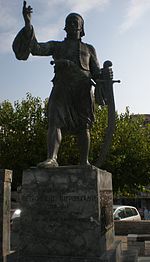- Mavromichalis
-
Mavromichalis is maybe the main clan family name related to war events of Modern Greece. According to early twentieth century's sources forty nine members of this clan offered their lives in the various conflicts the Greeks were involved since the Orlof uprising to the Balkan Wars.
Contents
Origin
According to the Maniot tradition, confirmed by the May 31 1870 epitaph of Anastasios-Petros Mavromichalis (which may be found in the Metropolis of Athens), the first members of the clan were refugees from the community of Kardias in Eastern Thrace who escaping from the Turkish attacks in 1452, resettled in Western Mani.
The name "Mavromichalis" is said to derive from an orphan boy named Michalis, since all orphan kids were called "mavros" which means "black" because of using dark clothes for mourning, so from this "mavro" Michalis future generations bore the name of "Mavromichalis" which simply means "Black Michael" but signifying "Michael the orphan".
Initially they established in Alica, but due to blood feuds and conflicts they moved to Tsimova in the eastern part of the Messenian Gulf and from there to their final destination in the seaside village of Limeni were they made their stronghold. After fortifying the village they took advantage of the port taxations during the Venetian domination which eventually arranged their land's virtual autocephaly.
Fame and Glory
Monument of Petros Mavromichalis in Areopoli.
The first renowned Mavromichalis leader is the 18th. descendant of the orphan boy, who was named Georgios Mavromichalis and was the hegemon of a rebellion that took place in the Peloponnesus sponsored by Count Orlov during the Russo-Turkish War of 1768-1774. Together with his sons Ilias-Pierros Mavromichalis and Ioannis "Skylogiannis" Mavromichalis he guided the warlike Maniots to events of glory defeating the Turks and Albanian allies.
Another relevant member of the family was a son of "Skylogiannis" who became a Turkish fleet admiral named Şükür Mehmet Bey. He was captured during battle and decided to embrace Islam and become a renegade. Although being a traitor to his motherland and religion Şükür was vital in making lobby for the appointment of his cousin Petros Mavromichalis as the de facto head of state of the Beylik of Mani by the Sublime Porte.
Under the leadership of Petrobey as he was called, the most wonderful pages of glory would be written in the history of the clan and Mani. By the time of the uprising of the Greek War of Independence, the Maniot state and the Mavromichalis family in particular were powerful enough to control the areas of southern Peloponnesus against both Greek rebels and Albanian raiders in behalf of the Sultan's request.
But Petros Mavromichalis was a patriot whose main goal was to free the rest of Greece from the Ottoman yoke. This way he voluntarily ceded the leadership of the rebellion in Theodoros Kolokotronis and contributed with a vital contingent of troops that liberated Kalamata and Tripolis, and participated in the expedition of help to the Souliotes where Petrobey's young brother Kyriakoulis Mavromichalis heroically found death fighting the Turks.
Plus, under the leadership of Petrobey, a remarkable commander like Ibrahim was defeated during the Egyptian Invasion of Mani which attempted to put and end to the whole Hellenic uprising in general and to the Maniot soveraignity in particular.
Aftermath
With the advent of the Modern State of Greece, the Mavromichalis family were key members of the "military party", which advocated in the formation of a decentralized state with autonomy for the provinces essentially the Peloponnesus that clashed against the Adamantios Korais' principles of a homogeneous, western, united and centralized state which was developed by the Capodistrian government and developed in the involvement of Greece's first president assassination in Nafplion.
In modern times, the most relevant member of the family was Kyriakos-Petros Mavromichalis, grandson of Kyriakoulis -the hero of the Independence- who was not a soldier this time but a lawyer and politician who became Prime Minister of Greece.
Sources
- Κ. Ζησίου, Οι Μαυρομιχάλαι. Συλλογή των περί αυτών γραφέντων, (K. Zisiou, The Mavromichalai. Collection of their own scripts, Athens,1903)
- Ανάργυρου Κουτσιλιέρη, Ιστορία της Μάνης, (Anargiros Koutsilieris, History of Mani, Athens, 1996)
Categories:- Mavromichalis family
Wikimedia Foundation. 2010.

